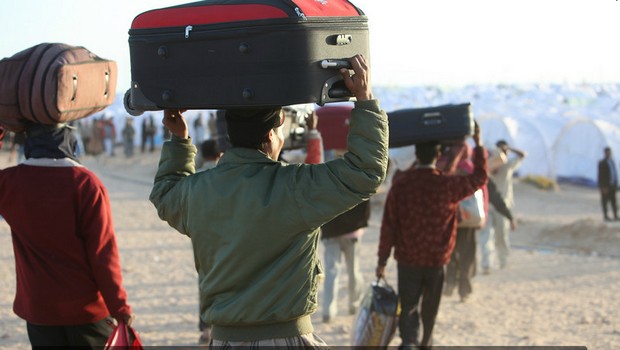
Rebuilding the Internet in a War Zone
[Source: Fast Company, by Neal Ungerleider, October 31, 2011]
 Sirte, Libya, was destroyed by three separate militaries. Nearly the entire population fled. Now a small group of NGOs are swooping in to quickly rebuild ... the Internet. Here's why it comes first.
Sirte, Libya, was destroyed by three separate militaries. Nearly the entire population fled. Now a small group of NGOs are swooping in to quickly rebuild ... the Internet. Here's why it comes first.The long, drawn-out Libyan rebellion is over. Viewers all over the world have seen the gruesome snuff videos of Qadaffi's death. For the country of Libya, one task is at hand: reconstruction. Some of the worst fighting of the war took place in Qadaffi's seaside hometown of Sirte. Over the past few days, a coalition of non-governmental organizations have dived into the war zone to create an impromptu satellite phone and Internet network for emergency first responders. The telecom network will allow hospitals and medical professionals to order urgently needed drug supplies for the first time in months.
European and Libyan professionals are using equipment donated by French nonprofit Télécoms Sans Frontières (TSF) to rebuild Sirte's telecommunications infrastructure. During the Libyan Civil War, the city was caught in the crossfire between Qadaffi loyalists, NATO and the rebels, creating destruction of World War II-like proportions. The city's isolation from the rest of Libya during the war has created urgent infrastructure problems; these issues have become especially acute for the operation of local hospitals and clinics. Two other NGOs, the International Medical Corps and the Agency for Technical Cooperation and Development, are providing the manpower and know-how to develop the emergency network.
Creating and rebuilding rudimentary telephone and Internet services is as important a priority for Sirte as restoring electricity and water service. In the 21st century, having the Internet is an urgent necessity for medical professionals working in any sort of urban environment. Aid workers simply can't bring enough satellite phones to help bring facilities back to operating status - supplies need to be ordered, out-of-region experts need to be consulted, and electricity/clean water secured. Without reliable communications to secure the local infrastructure, the city is at risk of lacking the resources to treat many likely health emergencies.
For Sirte, the idea is to create a type of satellite phone network called a Broadband Global Area Network (BGAN) as quickly as possible. These networks use tiny, laptop-sized individual terminals to connect users to Inmarsat's satellite network. The British firm is also one of the primary sponsors of TSF. Fast Company has reported before on how Libyan rebels built their own telecom systems, but this is different. NGOs saw an urgent need in this case - without the creation of some kind of rudimentary phone and Internet network, locals would literally lose their lives.
The United Nations' Office for the Coordination of Humanitarian Affairs (OCHA) also played a crucial role in obtaining bandwidth for the new telecommunications network. Creating this rudimentary network has been made even more difficult by the sheer scale of the destruction: Nearly every single person living in Sirte fled the city for the safety of camps several miles from the battlefront.
Over the next few decades, communications technology will become increasingly important to NGOs working in disaster areas. The Internet has become so intertwined with logistics and supply reordering that there is simply no way of disentangling them. Ironically enough, many of the bright young people increasingly attracted to Third World aid relief may find themselves working as an impromptu IT staff.
[Image: Libyan refugees in Tunisia via David Ohana/UN OCHA AVMU]


